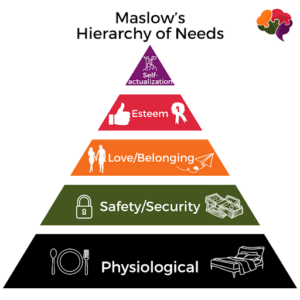In the dynamic, ultra-competitive world of business, marketing expert Bob Burg’s words echo through the corridors of commerce: “All things being equal, people will do business with, and refer business to, those people they know, like, and trust.”
As a seasoned marketing partner across numerous industries, we acknowledge the wisdom in these words while elevating one concept above all: Trust.
So, how much does trust actually matter in marketing, and why?
Meet Maslow
You might hear a question like the above and agree that trust matters a lot. In marketing, trust triumphs. But how do you establish trust? And what does it have to do with need?
Furthermore, does need factor in when you consider which businesses to rely on and whom to trust?
In 1943, American psychologist Abraham Maslow published a paper titled “A Theory of Human Motivation.” In this paper, he outlined a hierarchy of human needs. This landmark framework gives people a way to analyze and categorize their motivations and choices.
You’ve probably encountered this framework before. But if not, or if you simply need a refresher, here’s the rundown:

At the bottom of Maslow’s hierarchy are essential physiological needs: food, water, shelter, clothing for warmth, and sleep. Once these needs are met, we can focus on achieving the next level, which is safety and security. This could mean finding a safer place to live or a higher-paying job.
The third level is the need for love and belonging. Mentally and emotionally, we need relationships and community. Next, are esteem needs, which are things like prestige and a sense of accomplishment, the things that make us feel good about ourselves and keep us motivated to continue working toward goals.
After all of our other needs have been met, we can focus on self-fulfillment. This is often referred to as self-actualization or transcendence. It includes achieving one’s full potential and other creative pursuits, including all spiritual aspirations.
Trust and the Hierarchy
In the world of marketing, the foundation of the pyramid relates to the basic functions and reliability of a product or service. A company’s brand breeds trust—a sense of security—when it consistently delivers on its promises, ensuring that customers can rely on the products and services to meet their basic needs.
Think of your local grocery store. Many of us rely on this business to provide food, one of our most fundamental needs. But if the store does not routinely offer produce, dairy, or proteins, we learn we cannot trust it to meet our needs, and we will go elsewhere to shop.
Moving up the hierarchy, we encounter the need for belongingness and love—the desire for social connections, relationships, and community. Trust plays a pivotal role here: Consumers often seek products and services that align with their personal values and preferences and must feel confident that their purchasing decisions will deliver.
Brands that cultivate a sense of community or shared identity build trust by creating an emotional connection with their audience. Consider fitness brands that not only provide exercise equipment but also foster a community around a shared commitment to health and well-being.
The level of esteem in Maslow’s Hierarchy involves achieving a sense of accomplishment and gaining the respect of others. Esteem is essential to the self-image and outward image of brands as well as individuals.
In marketing, the established trust of consumers contributes significantly to a company’s image. Positive reviews signal the company is doing something right, and a track record of reliability elevates a brand’s esteem in the eyes of the consumer. This level of trust enables individuals to confidently associate themselves with a particular brand, knowing it reflects well on their own choices and who they project themselves to be, both out in the world and internally.
At the pinnacle of the hierarchy is self-actualization—the realization of one’s full potential. In marketing, this translates to brands that inspire personal growth and fulfillment. Trust becomes a catalyst for self-actualization when a brand not only meets the functional needs of the consumer but also contributes to their aspirations and ideals.
Brands that consistently deliver quality, innovate, and demonstrate ethical practices foster consumer trust that goes beyond transactional relationships. This trust becomes a driving force for personal development.
Aligning Your Offerings
Understanding where a product or service falls on Maslow’s Hierarchy of Needs is an important strategic move for business owners, as this framework offers a nuanced perspective on consumer motivations.
When you align your offering with specific needs—be they physiological, safety and security, belonging, esteem, or self-actualization—you gain critical insights into consumer behavior. This understanding informs targeted marketing and reveals untapped opportunities.
As you identify unmet needs on the hierarchy, opportunities to explore new avenues for innovation and marketing emerge. These insights can help you ensure your products resonate with consumers on a personal level, leading to increased relevance, loyalty, and a competitive edge in the market.
Why Trust Matters in Marketing
The intersection of Maslow’s Hierarchy and marketing reveals that trust is not just a desirable goal; it is an essential element for successful brand-consumer relationships. Several key reasons underscore the significance of trust in marketing:
- Building Long-Term Relationships: Trust fosters enduring relationships between brands and consumers. When customers trust a brand, they are more likely to become loyal patrons, making repeat purchases and advocating for the brand within their social circles.
- Reducing Decision-Making Anxiety: The marketplace is saturated with choices, and consumers often experience decision fatigue. Trustworthy brands alleviate this anxiety by providing a reliable option. When individuals trust a brand, they can make purchasing decisions with greater confidence.
- Emotional Engagement: Trust is a powerful catalyst for emotional engagement. Brands that evoke positive emotions and build positive emotional connections with consumers create a lasting impact by making them feel seen and understood. This emotional bond goes beyond product features, resonating with individuals on a personal level.
- Differentiation in a Crowded Market: In a competitive market, trust becomes a key differentiator. When consumers are faced with similar products or services, they are more likely to choose the brand they trust. Trustworthiness sets a brand apart, creating a unique selling proposition that goes beyond mere functionality.
- Adaptable to Change: Markets evolve and consumer preferences shift over time. Established trust creates a resilient foundation that allows brands to adapt to changing landscapes. When consumers trust a brand, they are more open to embracing new products, services, or changes in brand positioning.
In the End
Trust is the cornerstone for enduring customer loyalty and positive brand perception. We establish trust by consistently and reliably meeting the needs of consumers.
Sometimes certain circumstances—such as a need that must be met immediately; or, say, someone monopolizing the market with a product or service—can override the goal of trust in marketing. Yet it is still the ingredient that supersedes all others when it comes to fostering long-term customer relationships and sustainable business success.
Businesses that prioritize building and maintaining consumer trust create a solid yet flexible foundation, ensuring that when market dynamics shift or competition intensifies, the loyalty forged through trust becomes an invaluable asset that outlasts transient advantages. Manifested through reliability, authenticity, and ethical practices, trust becomes the thread that connects a brand with the diverse and evolving needs of consumers.
Understanding trust as a necessity, as well as how it acts as a strategic asset when aligned with consumer needs, ensures that your brand will stand the test of time. Trust is the destination. Intelligent marketing is the bridge to get you there. It’s time to start marketing smarter!


0 Comments